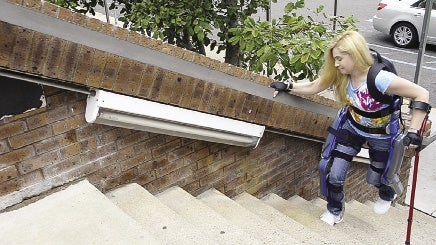ReWalk Robotics, whose U.S. headquarters is in Marlborough, is still working to make its exoskeleton units widely available to people with spinal cord injuries. But on the heels of a successful IPO earlier this month, CEO Larry Jasinski said the company is already planning to bring mobility to a wider population of disabled people.
In June, Rewalk received federal approval for its ReWalk Personal exoskeleton, designed to help people with spinal cord injuries walk. A robotic, wearable system, the ReWalk Personal provides power hip and knee motion, giving paraplegics the ability to walk.
CEO: Platform suited for many applications
Jasinski said the unit will likely serve as a base model for additional systems designed for people with multiple sclerosis and cerebral palsy, as well as those who have lost mobility due to stroke. A system designed for quadriplegics is also undergoing testing.
“We think the platform we have is a base technology that will meet many applications,” Jasinski said Monday, four days after the company closed its IPO, under which it raised $36 million to support growth of the existing business, as well as research and development.
Meanwhile, ReWalk hit a significant milestone in July, when the James J. Peters Veterans Administration (VA) Medical Center in the Bronx, N.Y., announced that all veterans who have received training on the system will receive full coverage for it. Priced at just under $69,500, the ReWalk Personal is cost prohibitive for many without insurance coverage, but he VA’s decision bodes well for the prospect of getting public and private insurance payers to provide coverage for the systems, Jasinski said.
System may cut medical bills while boosting well-being
The James J. Peters VA had conducted research on the ReWalk, which found that the increased mobility it gives patients will reduce overall spending on their treatment.
Jasinksi said the system goes a long way toward improving the overall health of its users, from preventing pressure sores and urinary tract infections that can lead to costly hospitalizations, to reducing incidents of diabetes and other insulin problems, as well as osteoporosis. Research also indicates that the system reduces users’ reliance on prescriptions to treat the myriad related complications.
Jasinski was struck by one ReWalk Personal user’s take on how the system changed his life.
“He said, ‘I’m glad I can walk, but what it’s doing to my body and what it’s doing to my well-being is probably more important than the actual waking itself’,” Jasinski said.
There are only three people using the ReWalk Personal in the U.S., and 19 worldwide, according to the company. Meanwhile, the company’s other product, the ReWalk Rehabilition, is more widely deployed at clinical centers in Europe, Israel and the U.S. Sixty-two of those systems were in use at last check,.
Those numbers are expected to grow as more insurers opt to cover the systems, Jasinksi said. The company has successfully gotten three private insurers in Germany to cover the ReWalk, which was launched in Europe in 2012, and Jasinski hopes for similar success in the U.S. Meanwhile, the company is planning to expand a leasing program meant to make the systems more affordable for the average user.
Marlborough site will house majority of ReWalk expansion
Given its prospects, ReWalk is planning to boost its operations, with the bulk of that growth expected to take place at the Marlborough headquarters at 33 Locke Dr. Jasinski said the company is looking to hire people for sales, marketing, training, service and clinical positions to support expanded commercialization efforts.
The company has 63 employees between Marlborough, Germany and its other headquarters in Israel, the homeland of founder Amit Goffer. A prolific inventor, Goffer was injured in an all-terrain vehicle accident in 1997, rendering him a quadriplegic. He designed the ReWalk out of a desire to help people like him regain mobility.
While the ReWalk Personal requires the use of one’s hands, Goffer hopes to walk again, using a quadriplegic system similar to the current ReWalk Personal model. Two of those prototypes are now being tested.
“We hope to see that in the future,” Jasinski said.

